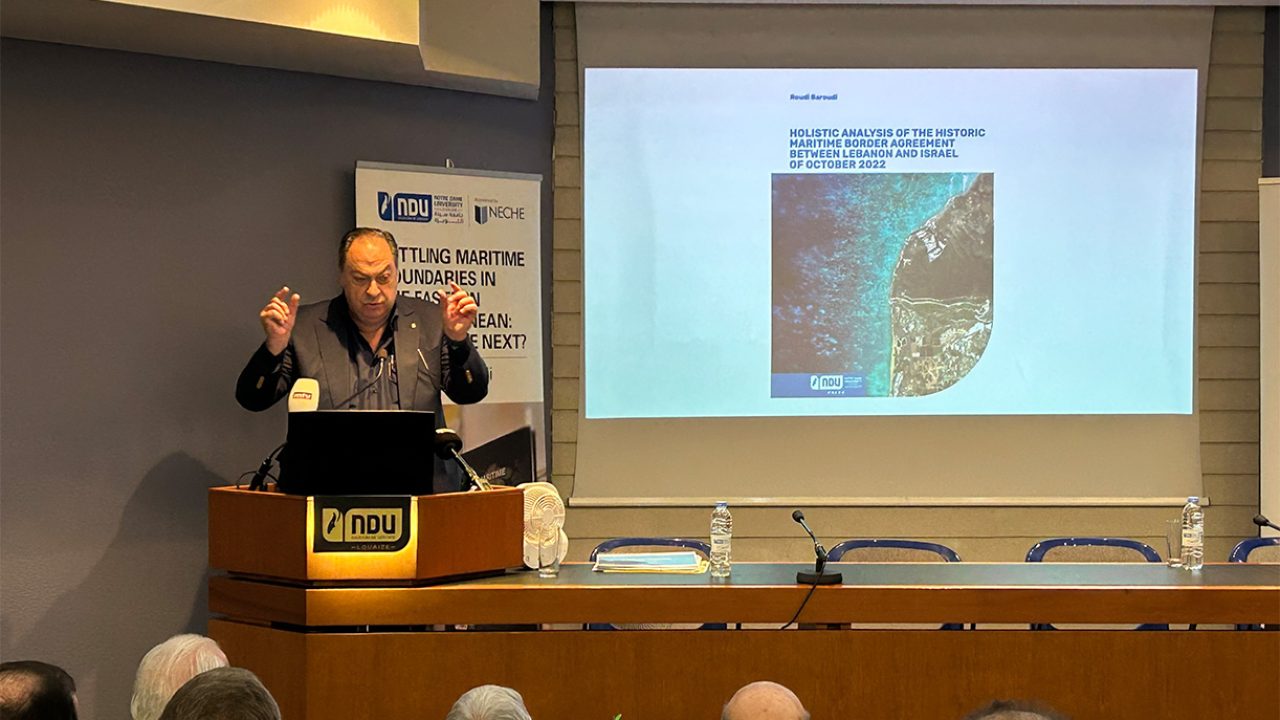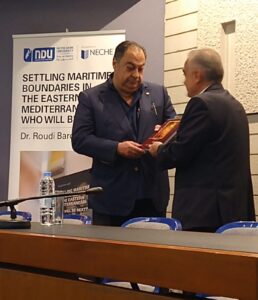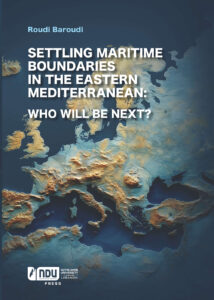ZOUK MOSBEH, 23-04-2025: Energy expert Roudi Baroudi signed copies of his latest book during a launch event at Notre Dame University – Louaize on Wednesday.
The book, “Settling Maritime Boundaries in the Eastern Mediterranean: Who Will Be Next?”, is part of Baroudi’s years-long effort to promote regional energy cooperation. In it, the author makes the case that if East Med countries are serious about exploiting their offshore hydrocarbons, they need to settle their maritime borders in order to attract the major energy companies whose technical and financial muscle are virtual prerequisites for undersea oil and gas activities.
Co-hosted by the Office of NDU Publications (which published the book) and the university’s Office of Research and Graduate Studies, the signing event took place at NDU’s Pierre Abou Khater Auditorium. All proceeds from sales of the book will go toward Student Financial Aid at NDU.
Inspired by the landmark US-brokered October 2022 agreement that saw Lebanon settle most of its maritime boundary with old foe Israel, the new tome stresses the need to define other East Med borders as well, including those between Lebanon and Cyprus, Lebanon and Syria, Syria and Cyprus, Cyprus and Turkey, and Turkey and Greece.
Publication was delayed by the outbreak of the Gaza war in October 2023, but the author says that conflict – which also led to massive destruction and loss of life in Lebanon – only underlines the need for regional players to find a new modus vivendi.
“We can’t keep doing the same things over and over again, and then expecting a different outcome,” Baroudi said during the NDU event. “For the first time in many years, all of Lebanon’s branches of government – Parliament, Cabinet, and Presidency – are fully functional. We have to start thinking of ways to reduce the scope for friction, to open the way for foreign investment, and hopefully start producing offshore gas.”
“Almost all of Lebanon’s energy needs are met by imported hydrocarbons; imagine if we discover enough gas to provide 24/7 electricity to all Lebanese,” he added. “And what if we had enough to start exporting it, too? Lebanon’s coast is less than 100 kilometers from Cypriot waters: this means that once the island and its partners have built a pipeline and/or a liquified natural gas plant, Lebanese gas could flow straight into the entire European Union, one of the world’s largest energy markets. The possibilities are endless. And now imagine all of the countries of the region having similar prospects – just because they finally got around to figuring out where their national waters begin and end.”
In addition to the manifold benefits of energy security and lucrative export revenues to fund domestic investment in things like education, healthcare, fighting poverty, and transport, Baroudi said the exercise of negotiating sea borders could help build trust and good will.
“There isn’t enough of those commodities in the East Med region, and often for good reason,” he explained. “But we have to start somewhere, and maritime boundaries are a great place to do that because they open the way for investment and various forms of cooperation, direct or indirect, including fisheries monitoring and regulation, marine protected areas, tourism, weather forecasting, search and rescue, etc.”
With more than 47 years of experience, Baroudi has worked in multiple fields, from electricity, oil and gas, and petrochemicals to pipelines, renewables, and carbon pricing mechanisms. He also has led policy and program development with, among others, the World Bank, the US Agency for International Development, the International Monetary Fund, and the European Commission. The author of several books – including “Climate and Energy in the Mediterranean: What the Blue Economy Means for a Greener Future” (2022) – as well as numerous studies and countless articles, his expertise has made him a highly sought-after speaker at regional energy and economic conferences. Currently serving as CEO of Energy and Environment Holding, an independent consultancy based in Doha, he is also a Senior Fellow of the Transatlantic Leadership Network, a Washington think-tank. In 2023, he received the TLN’s Leadership Award in recognition of his efforts to promote peace.





